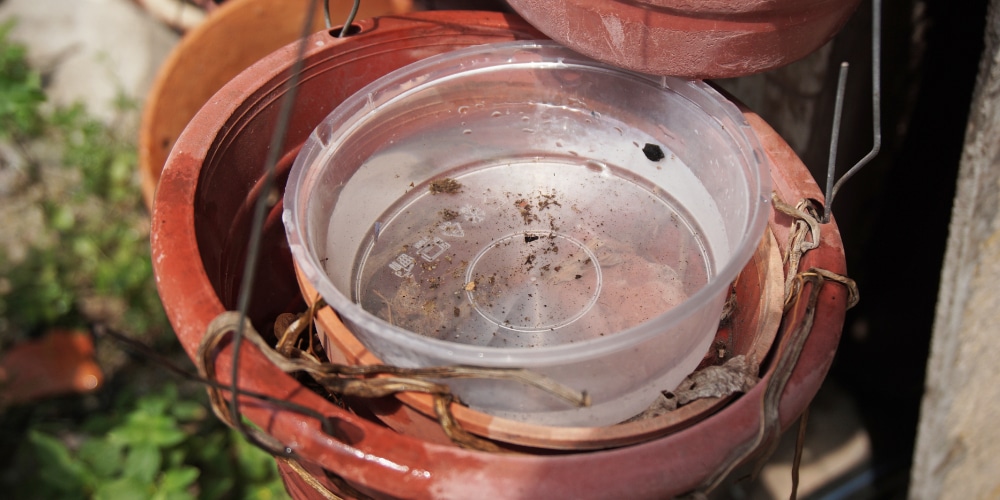
How to Treat Standing Water to Prevent Mosquitoes in Your Yard
February 24, 2023
By Daniel Baldwin, BCE, CCFS, CP-FS
Water features and decorative accents can enhance the beauty of your yard. Unfortunately, they can also become a breeding ground for mosquitoes. The good news is that you can treat standing water to prevent mosquitoes in your yard. In this guide, we teach you how and share other tips on how to prevent mosquito breeding nearby in stagnant water.
What are mosquitoes attracted to?
Adult female mosquitoes feed on blood, but scientists are only now beginning to understand what attracts them to people. One theory is that having high levels of substances called carboxylic acids on the skin makes a person more attractive to mosquitoes. There is also some evidence to suggest that the amount of sugar in a person’s diet may impact how likely they are to attract mosquitoes.
Water plays an important role in the mosquito life cycle. Female mosquitoes need moisture to lay their eggs, so they seek out any source of calm or stagnant water in the environment. Adult male mosquitoes tend to favor warm areas where moisture is present so they can find mates. Areas with stagnant water and flowering plants are especially appealing because the males’ diets consist mainly of nectar from blossoms.

Are mosquitoes harmful to humans?
Not all mosquitoes are harmful to humans. In fact, only 12 of the 200 known species in the U.S. can spread germs. However, the ones that do can cause serious infections, such as malaria, West Nile Virus, Zika, and dengue fever. Even when they don’t carry germs, mosquitoes can cause itchy, uncomfortable bites. Scratching bites can lead to infection and scarring.
Do mosquitoes have a purpose?
Although they’re annoying, mosquitoes do have a purpose in the natural world: The males serve as pollinators. As they move from flower to flower while feeding, they carry pollen from one plant to another, allowing fertilization to occur. There are very few plants that rely only on mosquitoes for pollination. This means that taking steps to keep mosquitoes from breeding in standing water is unlikely to have a major impact on the pollination of plants in your yard.
How to treat standing water to prevent mosquitoes
One of the most important things to keep in mind when learning how to stop mosquitoes in standing water is that no measure is guaranteed to eliminate mosquitoes completely. Combining various methods with other prevention tips and professional pest control services is often the best way to control these pests.
Some things that you can try include:
- Adding movement to water features: Installing water wigglers, bubblers, and waterfalls in ponds, reflecting pools, and other water features may help prevent mosquito breeding. Mosquitoes are less likely to breed in water that’s in motion, and any larvae inside will have difficulty surfacing to breathe.
- Applying vegetable oil: Placing a few drops of vegetable oil on the surface of standing water can increase the surface tension, making it difficult for larvae to breathe and feed.
- Using Bacillus Thuringiensis Israelensis: Also known as BTI, Bacillus Thuringiensis Israelensis is a natural bacteria that inhibits mosquito larvae growth without harming plants and wildlife that rely on the water. This type of treatment may be part of a Hawx service visit, so if you’re uncertain about how to use BTI, give us a call.
How to prevent mosquitoes from breeding in stagnant water
Taking other preventative measures can also potentially reduce the number of mosquitoes in your yard. To do so, follow these tips:
- Clean outdoor decorative accents regularly: Once per week, scrub out the inside of bird baths, buckets, tires, planters, toys, trash containers, flower pot saucers, and other items that are kept outside and capable of holding water.
- Block off access: Cover cisterns, buckets, rain barrels, and other water collection vessels tightly to keep mosquitoes from getting inside. Add wire mesh screen to the tops to limit entry for items that can’t be covered.
- Inspect outdoor plumbing and AC units: Check around outdoor faucets, pipework, and air conditioning units for water once per month. If you notice dampness or pools, consult a plumber or air conditioning repair technician to fix the leak before mosquitoes can find a new breeding spot.
- Keep gutters and downspouts clean: Twice per year, clean out all downspouts and gutters. Removing debris can help ensure that water continues to move freely rather than backing up and providing a place for mosquitoes to breed.
- Maintain your yard: Follow the recommended mowing schedule for the species of grass that you have. Longer grass can be inviting to mosquitoes.
- Check trees for holes: Twice per year, inspect trees on your property, looking for any holes that could hold water. Fill any that you find with water-resistant, expandable foam. Once the foam is in place, consider covering the hole with wire mesh. This will prevent animals like squirrels from damaging the foam. If you cut down trees, remove stumps, as they can collect water and offer a refuge for mosquitoes.
Premium pest control services
Professional pest control services can play an essential role in mosquito control. Hawx Pest Control can develop a customized treatment plan and identify breeding and nesting sites to treat. Our knowledgeable technicians will also provide personalized tips on how to stop mosquito breeding in stagnant water and recommend a maintenance schedule to lower the likelihood of future infestations.
RELATED POSTS



